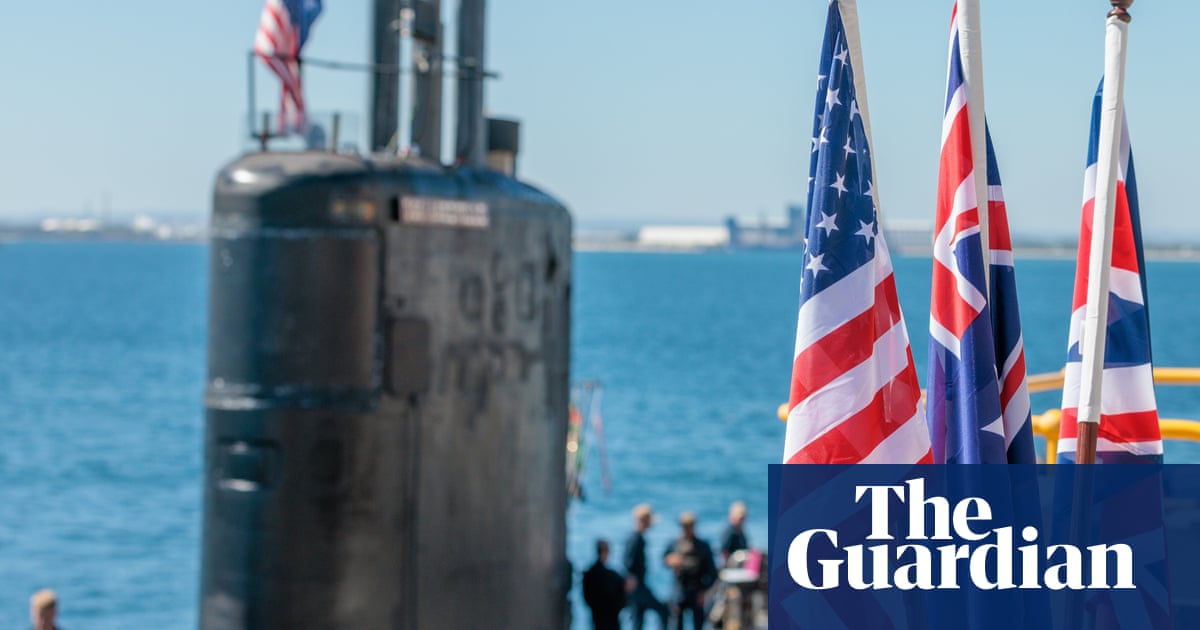Alliance in best interests of Australia, UK and US, say lawmakers, after Trump administration announced 30-day review of pact
Australia news live: latest politics updates
Get our breaking news email, free app or daily news podcast
The Aukus pact is vital to “deter Chinese aggression in the Indo-Pacific region”, Republican and Democrat lawmakers in the US have told the Pentagon, urging the US to recommit to the nuclear submarine deal with Australia and the UK.
The Trump administration announced this month it would undertake a 30-day review of the Aukus agreement – the deal struck in 2021 that would see US nuclear submarines sold to Australia, and new-design nuclear-powered Aukus submarines built in the UK and Australia.
A letter addressed to defence secretary Pete Hegseth, signed by five Republican and Democrat lawmakers, urged the Pentagon to back Aukus, despite growing concerns over laggard shipbuilding in both the US and UK.
“As the department of defense begins its 30-day review of the trilateral Aukus mission, we write to you to express our strongest support for the agreement.
The letter said the breadth and depth of support for Aukus within the US Congress had grown dramatically and “we have worked quickly to recognize Aukus’s mission to deter Chinese aggression in the Indo-Pacific region”.
Sign up for Guardian Australia’s breaking news email
It also pointed to progress made, saying “legislation necessary for Aukus to proceed had passed Congress; shipbuilding rates in the US had lifted substantially; and Australian naval officers had begun joint training on US nuclear-powered submarines.”
Asked about workforce challenges faced by both the US and UK shipbuilding industries, Marles said the “human dimension” was a key challenge in securing Aukus submarines.
“We are confident that we can get this right, but we’re not sanguine about it. There is a lot of work to be done to meet the human challenge, but we believe we can get it done.”
Democratic Congressman Joe Courtney, co-chair of the Friends of Australia Caucus (and whose district in Connecticut includes the shipbuilding hub of Groton), as well as Republicans Michael McCaul, chair emeritus of the House Foreign Affairs Committee, and Mike Rogers, chairman of the House Armed Services Committee, were the lead signatories on the letter.
Elbridge Colby, the under secretary of defence for policy at the Pentagon, is leading the 30-day US review, due to report in July.
Colby has consistently declared he is “very sceptical” about the pact and its benefits for America.
He told the US Senate armed service committee that the US was not building enough submarines for its own defence, and would not sell submarines to Australia if that might jeopardise American interests.
“We don’t want our servicemen and women to be in a weaker position and more vulnerable … because [the attack submarines] are not in the right place at the right time.”
Sign up to Breaking News Australia
Get the most important news as it breaks
Under pillar one of the Aukus agreement, the US will sell Australia between three and five Virginia-class nuclear-powered submarines, with the first to be delivered in 2032.
These will replace Australia’s ageing Collins class diesel-electric submarines to cover the “capability gap” before Australia’s own Aukus nuclear-powered submarines can be built.
By the “late 2030s”, according to Australia’s submarine industry strategy, UK shipbuilders will deliver the first specifically designed and built Aukus submarine to its own Royal Navy.
Australia’s first Aukus submarine – based on the UK design but to be built in South Australia – will be in the water “in the early 2040s”.
Aukus is forecast to cost Australia up to $368bn to the mid-2050s.
Australia is providing significant subsidies to the industrial bases of both the US and UK. It has already paid $A798m (US$500m) – the first instalment of $A4.7bn pledged – to the US. It will pay A$4.6bn to the UK.
But the deal’s feasibility has come under significant pressure regarding both nuclear-capable senior partners.
The US navy already has a shortfall of submarines, expected to worsen over coming years, and shipyards in America are running up to three years late in building new Virginia-class submarines, a 2024 US navy report found.
The UK parliament announced its own inquiry into Aukus in April, which will examine whether “geopolitical shifts since the initial agreement in 2021” have rendered the agreement unworkable.
In Australia, there have been calls from a chorus of voices – including naval experts, former prime and foreign ministers, submariners, anti-war groups, and the Greens – for a domestic inquiry into Aukus, its feasibility and potential benefits to Australia.
Source: www.theguardian.com
